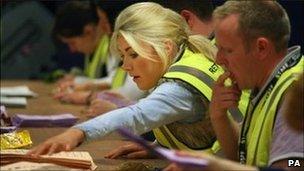UK 'will not block' Scottish independence referendum
- Published

The SNP wants to hold a referendum towards the end of the five-year parliamentary term
The UK government will not move to block a referendum on Scottish independence, the Secretary of State for Scotland has said.
Liberal Democrat MP Michael Moore said there would not be constitutional questions raised about the rights or wrongs of holding a vote.
The newly-elected majority SNP Scottish government intends to bring forward a referendum in its five-year term.
The Conservatives, Labour and Lib Dems all oppose independence.
Mr Moore told BBC Scotland's Politics Show it was now up to the SNP to bring forward the referendum, which First Minister Alex Salmond said would come "well into the second half" of the new, five-year parliament.
"I firmly believe the Scottish Parliament, if it so decides, can proceed with a referendum," Mr Moore said, adding: "There will be the normal electoral rules that have to be followed and it will have to be discussed carefully with the relevant authorities."
The Scottish secretary added: "We could, I suppose, try to make a constitutional issue about where the powers lie or don't, but I don't think that would be a sensible use of anybody's time.
"If the issue of the day is to decide the future of Scotland within the United Kingdom, then that's more important we have that debate, rather than have a debate about whether or not we can have the debate."
Rather than the referendum, Mr Salmond has decided to concentrate for the moment on further devolution of powers to Holyrood as part of the Scotland Bill, currently going through Westminster.
The first minister told BBC Scotland his party had received an "overwhelming mandate" from the people for "job-creating powers", namely control over borrowing, the Crown Estates Commission and corporation tax.
But he added: "Even if we gained all these things, that would give the Scottish Parliament control over approximately 20% of the revenue base of Scotland.
"Independence would give the Scottish Parliament, the Scottish people, control over almost 100% of the revenue base of Scotland."
Challenged on why the referendum was not being held sooner, Mr Salmond said: "That's the plan we outlined to the Scottish people very clearly in our election campaign - we did so consistently. We've been backed overwhelmingly by the Scottish people on that prospectus.
"So you don't change it now just because you have an overwhelming majority.
"The people have showed faith in the Scottish National Party, and therefore the SNP government will repay that faith and keep faith with the people."
Meanwhile, Labour leader Ed Miliband told BBC One's Andrew Marr Show his party must set out an alternative vision to independence, adding: "I don't think the majority of people in Scotland want independence or separatism."
Scottish Conservative deputy leader Murdo Fraser called on the UK government to give "very serious consideration" to launching its own referendum on the future of the UK constitution to prevent a "damaging" and long-running debate.
Defence Secretary Liam Fox, said: "Whether the result in Scotland was the Scottish voters actually positively having a view on independence is, I think, very much up for debate."
The Conservative minister told the Sky News Murnaghan programme: "I think it was very much more about Labour having taken voters in Scotland for granted and the old Labour fiefdoms rebelling."